OECIS prepares students to be active participants in a lifelong journey of learning
东方英文书院国际部(OECIS)
——致力于培养学生成为终身学习者
IB Education
IB教育
OECIS, designed for 7 to 19 year olds, is unique because of its academic and personal rigour, challenging students to excel in their studies and personal growth. We offer a curriculum that is broad and balanced, conceptual and connected and in which students strive to become inquirers, knowledgeable, thinkers, communicators, principled, open-minded, caring, risk-takers, balanced, and reflective. We try every possible means to inspire students’ quest for learning throughout life that is marked by enthusiasm and empathy, aiming to help them develop into well-rounded adults with character who respond to challenges with optimism and an open mind, are confident in their own identities, make ethical decisions, join with others in celebrating our common humanity and are prepared to apply what they learn in real-world, complex and unpredictable situations. We also help students to develop the attitudes and skills they need for both academic and personal success within global contexts.
OECIS专为7至19岁的学生设计,因其学术的严谨性和对学习者的高标准要求而独具特色,它挑战学生在学习和个人成长方面努力追求卓越。我们提供的课程全面均衡、理念先进且相互联系。在课程中,学生努力成为积极探究、知识渊博、勤于思考、善于交流、坚持原则、胸襟开阔、懂得关爱、勇于尝试、全面发展和及时反思的学习者。我们尽一切可能激励学生成为富有同情心和热情的终身学习者,旨在帮助学生成为全面发展的人。他们将以乐观开放的心态面对挑战,他们将拥有自信的身份认同,他们将做出合乎道德准则的决定,他们将具备强烈的人文主义关怀,他们也随时准备在复杂变化的情境中应用所学知识。我们还培养学生在全球范围内取得学术和个人成功所需的态度和技能。
国际学校办学宗旨
OECIS Mission Statement
我们致力于营造充满尊重、反思且富含创造力的国际化学习氛围,通过创设融汇东西文化精粹且能激发求知欲的完整课程体系,来挑战和激励每位学生,充分挖掘其美德、智力、身体方面的潜能,助其成为具有国际情怀的终身学习者。
We are committed to challenging and inspiring each child to reach his or her ethical, intellectual and physical potential to become life-long learners with international mindedness through a cross-cultural, stimulating, and fully integrated curriculum that is internationally based within a respectful, reflective and creative learning environment.
国际学校愿景宣言/OECIS Vision Statement
我们通过教育塑造未来!
We educate to shape the future!
OECIS Strategy
OECIS Strategy 国际学校战略规划
我们致力于学习国际课程IB项目之先进理念,并扎根中华民族文化沃土,通过融汇东西文化精粹且能激发求知欲的、全面均衡又相互联系的完整课程体系,培养具有国际视野和国际情怀的“德、智、体、美、劳”全面发展和及时反思的终身学习者,鼓励学生成为创造性、批判性和反思性的思考者,为学生走向世界,成为未来在国际社会中有话语权、对世界和平与发展作出贡献的人铺路奠基。
We embrace the IB mission statement and philosophy of education, integrate the IB framework with the national curricula into a highly heuristic, balanced and organic curricula, nurture and inspire, through a thorough acculturation of the Chinese and Western cultures, each and every student to be a life-long learner who grows up into a law-abiding global citizen and contributes his/her best to the continuous improvement of the world. Every possible effort is made to provide students with a heuristic education focusing on the cultivation of their intellectual, moral, physical wellbeing and aesthetic appreciation. Students are encouraged and urged to embark on a well-balanced learning journey: take calculated risks if and when necessary, regularly reflect on their plan and action with an open-mind toward different opinions, habitually think individually, critically and creatively and know how to communicate with people of different religious and cultural backgrounds, and thus lay down a solid foundation in and get well prepared for their future roles in the global development of tomorrow.
IB Primary Years Program (PYP)
IB 小学项目(PYP)

Our PYP is designed for students aged 7 to 12 with focus on the development of the whole child as an inquirer, both in the classroom and in the world outside. It is a framework guided by six transdisciplinary themes of global significance, explored using knowledge and skills derived from six subjects areas, as well as transdisciplinary skills, with a powerful emphasis on inquiry. The PYP is flexible enough to accommodate the demands of our national curriculum and provides the best preparation for students to engage in their studies in IB MYP.
我们的PYP课程专为7-12岁的学生量身打造,关注孩子作为探究者的发展过程,无论是课内还是课外。PYP课程以六个具有全球意义的超学科主题为指导框架,探索如何运用六个学科的知识技能及超学科技能,其中以探究能力的培养为重点。PYP具有很强的灵活性,能够满足我们国家课程的要求,并为学生进入IB MYP的学习提供充足的准备。
PYP is unique as it
addresses students’ academic, social and emotional well-being;
encourages students to develop independence and to take responsibility for their own learning;
supports students’ efforts to gain understanding of the world and to function comfortably within it;
helps students establish personal values as a foundation upon which international-mindedness will develop and flourish.
PYP的特色在于:
注重提升学生的学术能力、社交能力和幸福感;
鼓励学生培养独立性,鼓励学生以学习为己任;
支持学生努力了解世界,并对世界做出贡献;
帮助学生树立个人价值观,以此为基础培养和发展国际情怀。
PYP subject areas include:
language
ocial studies
mathematics
arts
science
personal, social and physical education
PYP的学科领域包括:
语言
社会研究
数学
艺术
自然科学
个人、社交和体育
The most outstanding features of PYP are the six transdisciplinary themes, namely
Who we are: Inquiry into the nature of the self; beliefs and values; person, physical, mental, social and spiritual health; human relationships including families, friends, communities, and cultures; rights and responsibilities; what it means to be human.
Where we are in place and time: Inquiry into orientation in place and time; personal histories; homes and journeys; the discoveries, explorations and migrations of humankind; the relationship between the interconnectedness of individuals and civilizations, from local and global perspectives.
How we express ourselves: Inquiry into the ways in which we discover and express ideas, feelings, nature, culture, beliefs and values; the ways in which we reflect on, extend and enjoy our creativity; our appreciation of the aesthetic.
How the world works: Inquiry into the natural world and its laws, the interaction between the natural world (physical and biological) and human societies; how humans use their understanding of scientific principles; the impact of scientific and technological advances on society and on the environment.
How we organize ourselves: Inquiry into the interconnectedness of human-made systems and communities; the structure and function of organizations; societal decision-making; economic activities and their impact on humankind and the environment.
Sharing the planet: Inquiry into rights and responsibilities in the struggle to share finite resources with other people and other living things; communities and the relationship within and between them; access to equal opportunities; peace and conflict resolution.
PYP最突出的特点是六个超学科主题,即:
我们是谁:探究自我的本质;信念和价值观;个体、身心、人际关系和精神健康;人际关系包括家庭、朋友、社区和文化;权利和义务;人的本质。
我们在时空中的定位:地点和时间定位探讨;个人背景;居家和旅行;人类的发现、探索和迁徙;地方和全球视野下个人与文明之间的相互关系。
如何表达自我:探究我们发现和表达思想、情感、自然、文化、信仰和价值观的方式;我们反思、拓展和享受创造力的方式;我们对审美的理解。
世界如何运转:探究自然界的规律,及自然世界(物理和生物)与人类社会之间的相互作用;人类如何利用科学原理;科技进步对社会和环境的影响。
人类如何组织管理自我:探讨对人类系统和社区之间相互联系;组织的结构和功能;社会决策;经济活动及其对人类和环境的影响。
共享地球:探讨与他人和其他生物分享有限资源的权利和责任;社区之间及社区内部组成部分之间的关系;机会均等;和平及冲突解决方案。
PYP offers student-centered learning with the provision of an ideal foundation for children to become successful, lifelong learners by developing their:
social and emotional well-being;
independence, as they take responsibility for their own learning;
international mindedness;
understanding of the world and their ability to function effectively within it;
attitudes and dispositions for learning;
ability to take mindful, appropriate and sustainable student-initiated action;
language skills: all students study an additional language from 7 years of age.
PYP课程以学生的学习为中心,为孩子们的成功、为培养终身学习者提供了一个理想的基础。PYP致力于发展学生诸多方面的素养:
社交和情感的幸福感;
独立性,鼓励学生以学习为己任;
国际情怀;
了解世界,对世界做出有效贡献的能力;
对待学习的态度和倾向;
采取谨慎、适当和可持续的自主行动的能力;
语言技能:所有学生从7岁开始学习一门额外的语言。
The Exhibition——an important part of the PYP for all students
In the final year of the Program, students undertake a collaborative, transdisciplinary inquiry process that involves them in identifying, investigating and offering solutions to real-life issues or problems. As the culminating experience of the PYP, the Exhibition offers students an exciting opportunity to demonstrate independence and responsibility for their own learning. During their preparation for the Exhibition, young learners conduct an in-depth inquiry into real life issues or challenges, and present their research, investigation and resulting action to the whole school community.
毕业成果展——PYP的重要组成部分
在PYP课程的最后一年,学生们将合作完成一个超学科的探究项目。在探究项目中,他们需要识别、调查现实生活中存在的问题,并为之合理的解决方案。作为PYP的终极体验,毕业成果展为学生提供了一个展示他们学习独立性和责任感的机会。在毕业成果展的准备过程中,青少年学习者对现实生活中的问题或挑战进行深入的探究,并向整个学校展示他们的研究、调查和最终成果。




The Middle School Program
国际中学项目
The Middle School Program is designed for students aged 11 to 16. It provides a framework of learning that encourages students to become creative, critical and reflective thinkers. The Middle School Program emphasizes intellectual challenge, encouraging students to make connections between their studies in traditional subjects and the real world. The Middle School Program is flexible enough to accommodate our national requirements. It builds upon the knowledge, skills and attitudes developed in PYP and prepares students to meet future academic challenges, including the IB Diploma Program (DP) and the provincial high school entrance examination curriculum.
国际中学课程是为11至16岁的学生设计的。它提供了一个学习框架,鼓励学生成为创造性、批判性和反思性的思考者。中学课程强调智力挑战,鼓励学生在传统学科和现实世界之间建立联系。中学课程课程是非常灵活的,且符合我们的国家要求。它建基于学生在PYP所获得的知识、技能和态度之上,并为学生应对未来的学术挑战提供准备,包括IB国际文凭大学预科项目(DP)以及省中考课程。
The Middle School Program aims to:
provide students with opportunities to develop the knowledge, attitudes and skills they need in order to manage complexity and take responsible action for the future;
ensure breadth and depth of understanding through study in eight subject groups;
require the study of at least two languages (language of instruction and additional language of choice) to support students in understanding their own cultures and those of others;
empower students to participate in service within the community.
国际中学课程旨在:
为学生提供发展所需知识、态度和技能的机会,以合理处置复杂的情况,并对未来采取负责任的行动;
通过对八个学科组的研究,确保理解的广度和深度;
要求学习至少两种语言(教学语言和其它可选语言),以帮助学生了解自己的文化和其他文化;
授权学生参与社区服务。
The Middle School Program comprises eight subject groups:
Language acquisition.
Language and literature.
Individuals and societies.
Sciences.
Mathematics.
Arts.
Physical and health education.
Design
国际中学课程包括八个学科组:
语言习得
语言与文学
个人和社会
自然科学
数学
艺术
体育和健康教育
设计
Our approaches to teaching and learning
教学方法和学习方法
Teaching and learning in the The Middle School Program is underpinned by the following concepts:
▷Teaching and learning in context: Students learn best when their learning experiences have context and are connected to their lives and their experience of the world that they have experienced. Using global contexts, The Middle School Program students develop an understanding of their common humanity and shared guardianship of the planet through developmentally appropriate explorations of:
identities and relationships;
personal and cultural expression;
orientations in space and time;
scientific and technical innovation;
fairness and development;
globalization and sustainability.
▷Conceptual understanding: Concepts are big ideas that have relevance within specific disciplines and across subject areas. The Middle School Program students use concepts as a vehicle to inquire into issues and ideas of personal, local and global significance and examine knowledge holistically. The Middle School Program prescribes sixteen key interdisciplinary concepts along with related concepts for each discipline.
▷Approaches to learning: A unifying thread throughout all The Middle School Program subject groups, approaches to learning provide the foundation for independent learning and encourage the application of their knowledge and skills in unfamiliar contexts. Developing and applying these social, thinking, research, communication and self management skills helps students learn how to learn.
▷Service as action, through community service: Students take action when they apply what they are learning in the classroom and beyond. IB learners strive to be caring members of the community who demonstrate a commitment to service—making a positive difference to the lives of others and to the environment.
国际中学课程的教学活动和学习活动以下列概念为基础:
▷情境教学:当学生具备足够的背景知识,并将其与他们的生活经历、他们所经历的世界经验联系在一起时,学习效果最好。在全球化情境下,学生通过以下途径来探索、了解他们共同的人性,并共享守护地球的责任:
身份与关系;
个人表达和文化表达;
时空定位;
科技创新;
公平与发展;
全球化和可持续发展。
▷概念理解:概念是在特定学科和跨学科领域中具有相关性的大思想。学生以概念为工具,探讨有关个人、地方和全球意义的问题和想法,并全面地检查知识体系。国际中学课程规定了16个关键的跨学科概念以及每个学科的相关概念。
▷学习方法:学习方法贯穿于中学所有学科组中,它为独立学习提供基础,鼓励学生在不熟悉的环境中运用他们的知识和技能。培养和应用这些社交、思考、研究、交流和自我管理的技能,有助于学生学会如何学习。
▷社区服务:学生们将课堂内外所学知识学以致用。学习者努力成为社区中的热心者,他们致力于服务他人,对他人的生活和环境产生积极影响。
The Middle School Program fosters the development of skills for communication, intercultural understanding and global engagement—essential qualities for young people who are growing up into global leaders.
国际中学课程项目旨在培养沟通、跨文化理解和参与全球事务的技能,这些技能对于正在成长为全球领导者的年轻人至关重要。
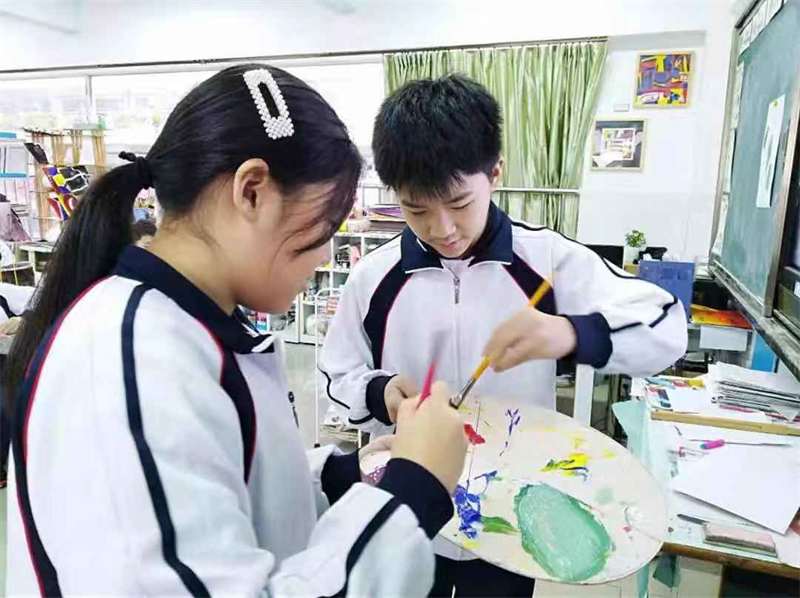

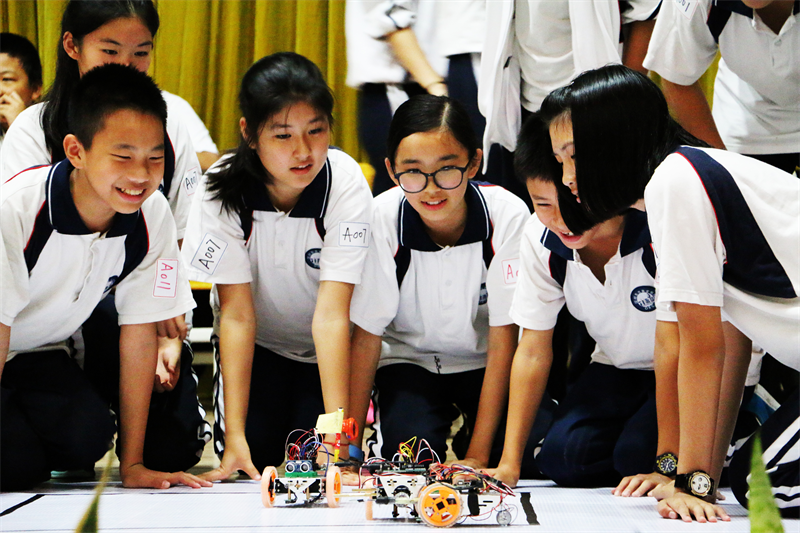
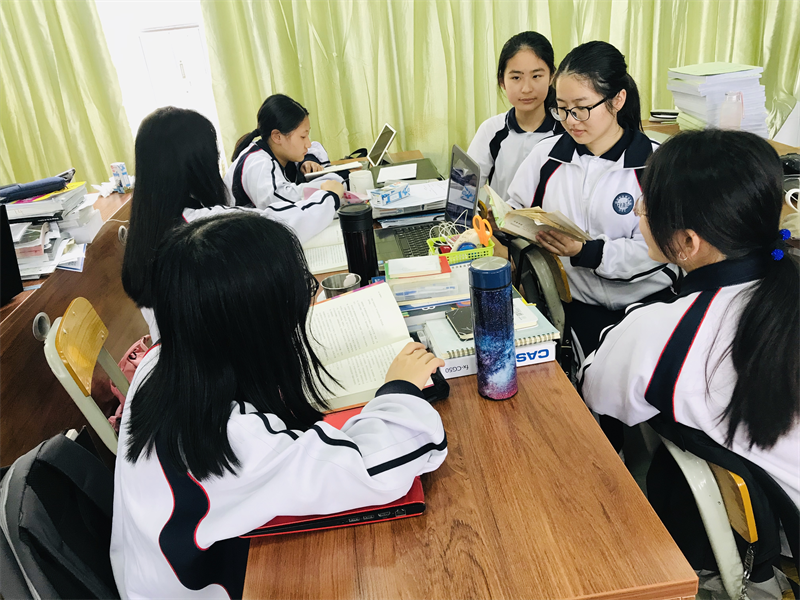
The Diploma Program (DP)
国际文凭大学预科项目(DP)
DP is a two-year international education Program that prepares students aged between 16–19 years for success going into, and throughout, university. The DP offers a holistic approach to teaching and learning with a keen focus on developing intercultural awareness. Students learn to explore and understand the world around them through inquiry, critical thinking and open-mindedness.
DP是一个为期两年的国际教育项目,旨在帮助16-19岁的学生顺利进入大学,并在整个过程中取得成功。DP提供了一个整体的教学方法,重在培养跨文化意识。学生们通过探究、批判性思考和开放的心态来探索和理解周围的世界。
DP offers to students:
a challenging academic curriculum that serves as outstanding preparation for university and higher education;
a student-centered approach to teaching, focused on developing students intellectually, emotionally, physically and socially, as opposed to preparation for test-taking only;
a focus on international-mindedness, compassion, and understanding intercultural differences;
respected, reliable and world-renowned academic preparation;
DP为学生提供:
具有挑战性的学术课程,作为大学和高等教育的准备;
以学生为中心的教学方法,注重从智力、情感、身体和社交能力等层面培养学生,而不是仅仅为应试做准备;
注重国际情怀、同情心和理解不同文化间的差异;
为进入受人尊重的、可靠的和世界知名的学术殿堂作准备;
What's unique about the DP curriculum?
DP students complete courses from six subject groups, ensuring a depth and breadth of knowledge and understanding. By engaging with a range of subjects, they experience a comprehensive education that encourages them to link their learning to form a more useful way to apply what they've learned. The study of an additional language is also required, as well as the completion of a compulsory Program core consisting of three components:
Theory of knowledge (TOK) challenges students to reflect on the nature of knowledge and how we know what we claim to know.
The Extended essay introduces students to the demands and rewards of independent work prior to entering university, requiring them to produce a self-directed piece of research in an area of personal interest
Creativity, activity and service (CAS) is an experiential learning component where students engage with a wide variety of extracurricular activities, including community service and athletic options.
DP课程的特色是什么?
DP学生完成六个学科组的课程,确保知识和理解的深度与广度。通过不同学科组的学习,他们接受了一个全面的教育,这鼓励他们把学习联系起来,从而形成一个更有效的方法来学以致用。此外,学生还需要学习其他语言,并完成必修课程,其核心包括三个部分:
知识论(TOK)要求学生反思知识的本质,以及我们如何知道我们声称所知道的知识。
拓展论文向学生介绍了进入大学之前独立学习的要求及回报,要求他们在个人感兴趣的领域进行自我指导的研究。
创造、活动与服务(CAS)是体验式学习的一个组成部分,学生参与各种各样的课外活动,包括社区服务和体育活动。
The six subject groups of DP include:
Studies in language and literature---OECIS offers Language A Literature HL & SL(in Chinese, English and Korea).
Language acquisition---OECIS offers Language B HL, SL and ab intio(English, Chinese and Korea).
Individuals and societies---OECIS offers Business Management Hl & SL, Economics HL & SL (English).
Sciences---OECIS offers physics, chemistry and biology HL & SL(English).
Mathematics---OECIS offers Mathematics: Analysis and Approaches, and Applications and Interpretation, HL and SL (English).
The arts---OECIS offers Visual Arts (English).
大学预科项目的六个学科组包括:
语言与文学研究——OECIS提供语言A:文学HL和SL课程(中文、英语和韩语)
语言习得——OECIS提供语言B HL、SL和ab intio课程(英语、汉语和韩语)
个人和社会——OECIS提供工商管理HL和SL课程,经济学HL和SL课程(英语)
自然科学——OECIS提供物理、化学和生物HL和SL课程(英语)
数学——OECIS提供数学:分析和方法;应用和解释HL和SL课程(英语)
艺术——OECIS提供视觉艺术课程(英语)
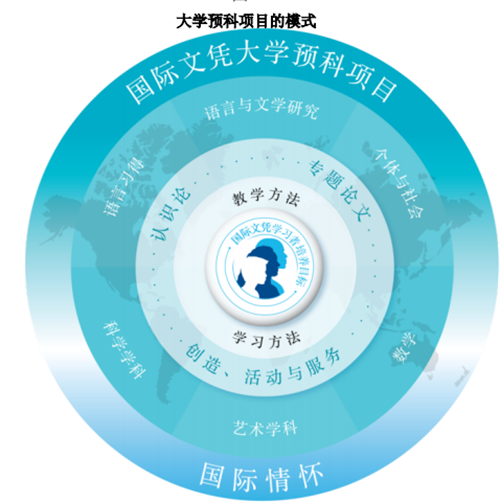
Choosing subjects in the Diploma Program
选择国际文凭课程的科目
Students choose one course from each of the above-mentioned subject groups and they may opt to study an additional sciences, individuals and societies, or language course, instead of a course in the arts.
Each student takes at least three (but not more than four) subjects at higher level, and the remaining at standard level. HL and SL courses differ in scope but are measured according to the same grade descriptors, with students expected to demonstrate a greater body of knowledge, understanding and skills at higher level.Standard level subjects take up 150 teaching hours. Higher level comprises 240 teaching hours.
学生从上述各学科组中选择一门课程。如果不选择学习艺术课程,他们可以选择学习一门其他的自然科学、人文科学或语言课程。每个学生至少要学习三门(但不超过四门)高级课程(HL),剩下的则是标准课程(SL)。HL和SL课程的范围不同,但根据相同的评估标准进行衡量。相对而言,HL课程要求学生展示出更丰富的知识、理解力和技能。标准课程(SL)占150学时,高级课程(HL)包括240学时。
Assessment and Exams
评估和考试
The International Baccalaureate® (IB) assesses student work as direct evidence of achievement against the stated goals of the DP courses. DP assessment procedures measure the extent to which students have mastered advanced academic skills in fulfilling these goals, for example:
analyzing and presenting information;
evaluating and constructing arguments;
solving problems creatively.
国际文凭组织®(IB)评估学生考核项目的最终成果,将其作为学术成绩的直接证据,而不是DP课程平时的考试分数。DP评估程序衡量学生在实现这些目标时所掌握的高级学术技能,例如:
分析和组织信息;
评估和构建论据;
创造性地解决问题。
Basic skills are also assessed, including:
retaining knowledge;
understanding key concepts;
applying standard methods.
还评估了基本技能,包括:
记忆知识;
理解核心概念;
采用标准方法。
Student results are determined by performance against set standards, not by each student's position in the overall rank order, through a systematic external and internal assessment.
通过系统的外部和内部评估,学生的成绩取决于是否达到了既定标准,而不是每个学生在整体排名中的位置。


Developing students in the DP
在DP课程中培养学生
The DP is an academically challenging and balanced Program of education. It addresses the intellectual, social, emotional and physical well-being of students, and is respected by universities across the globe.
Each of the IB’s Programs, namely, PYP, The Middle School and DP, is committed to the development of students according to the attributes shown in the IB learner profile.
DP课程是一个在学术上具有挑战性和平衡性的教育计划。它涉及学生的智力、社交能力、情感和身体健康,受到全球各所大学的认可。
IB的每一个项目,即PYP、国际中学和DP,都致力于根据IB学习者档案中显示的属性培养学生。
多渠道的出口选择
我校招收世界各地的学生,以开放包容的教育心态展现了与世界接轨的教学特色。
国际部的PYP、国际中学、DP的课程相互衔接,形成了的一个有效的课程循环体。特别是DP学生入校时,升学指导老师会根据学生的兴趣爱好以及专业特长全程为学生的课程选择、专业方向以及职业规划保驾护航。
有了学生和老师们的提前规划,学生在DP2的后半段就能陆陆续续收到来自世界各地知名大学的Offer,有的学生甚至能提前拿到10几所大学抛来的橄榄枝,为学生提供更加多元化的选择。
随着学校对国际化教学的深耕细作,我们不仅保障了了学生的身心健康,学生的国际名校录取率也年年攀升,稳居高位。
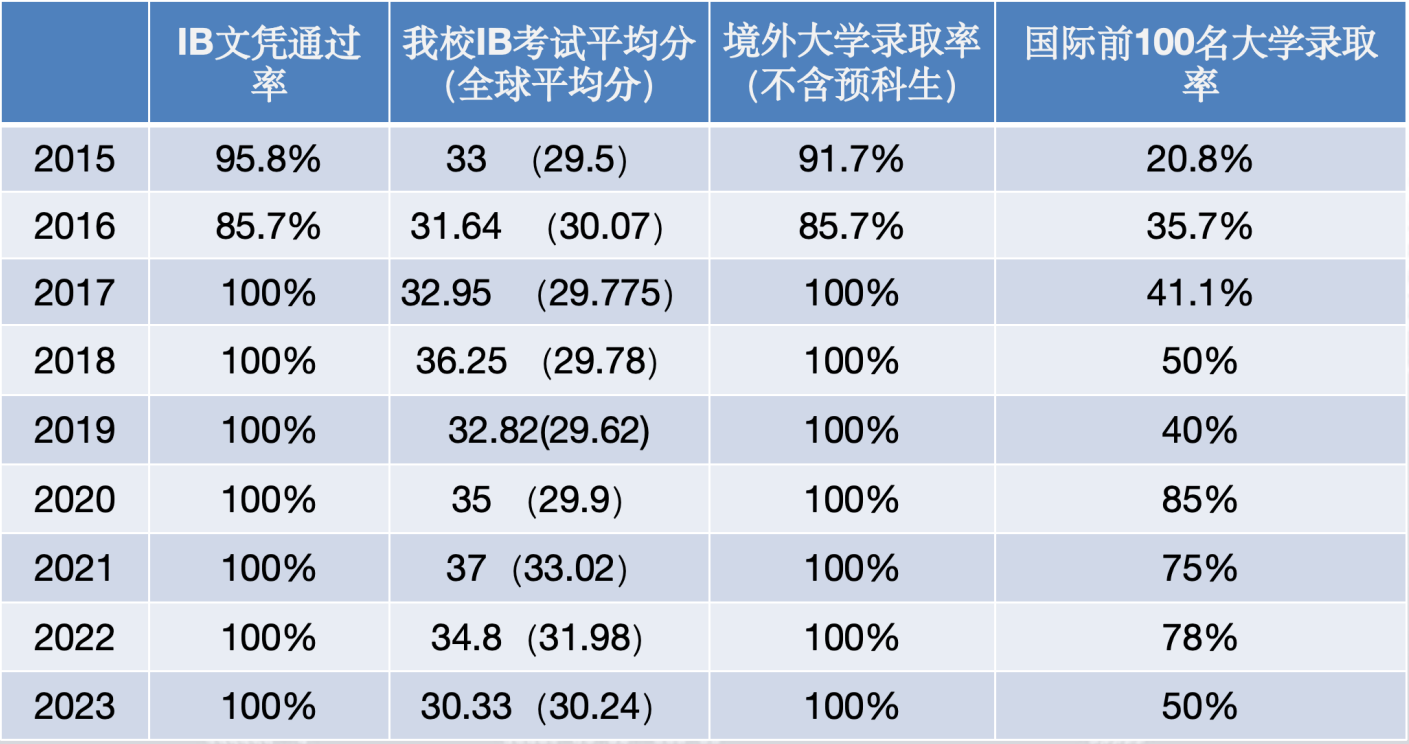
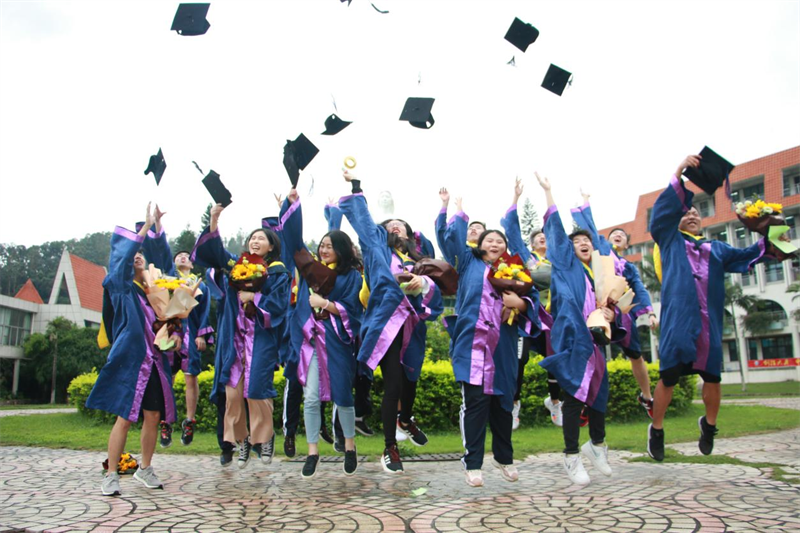
DP学科简介
G1
第一语言A 汉语文学组课程简介
语言A:文学是一门文学课程。文学课程鼓励学生欣赏文学的艺术特质,培养对自己的阅读进行批判性反思的能力。通过仔细研究每一部作品和节选,在对一系列批评方法加以考虑的过程中,将作品置于其文学和文化背景中加以学习。文学研究就是探讨人们日常生活中的追求、焦虑、喜悦和恐惧的复杂表达方式。文学研究使学生能够对这一经久不衰的人类创造领域进行探索,并给他们提供开展独立、创新、具有批判性和清晰思考的机会。
Language A: literature is a literature course. The literature course encourages students to appreciate the artistic qualities of literature and develop the ability to critically reflect on their own reading. Through careful study of each work and excerpt, the work is studied in its literary and cultural context in the process of considering a range of critical methods. Literary studies are concerned with the complex expressions of pursuits, anxieties, joys and fears in People's Daily lives. Literary studies enable students to explore this enduring field of human creativity and provide them with the opportunity to develop independent, innovative, critical and clear thinking.
G2
第二语言习得组英语、法语课程简介
English B
英语B是一门语言习得课程,提供给有英语学习经验的学生。本课程旨在通过对语言、主题和文本的学习,进一步培养学生用英语交流的能力。英语B课程为学生提供必要的技能和跨文化理解,使他们能够在讲英语的环境中成功地进行交流。
English B is a language acquisition course provided for students with some previous experience of English. It is designed to further develop students’ ability to communicate in English through the study of language, themes and texts. English B provides students with the necessary skills and intercultural understanding to enable them to communicate successfully in an environment where English is spoken.
French ab.
法语初级语言课程属于IB课程的第二学科组,针对的是以前稍有接触或从未接触过法语的学生。课程旨在促进学生掌握必要的语言技能,培养对多元文化的理解,使他们能够在讲法语的环境中成功地进行交流和沟通。这一学习过程鼓励学生走出课堂,认识世界,尊重文化的多样性。
French ab initio belongs to Group 2 of IB Diploma Program which is designed for students with little or no prior experience of the language. The aim of the course is to provide students with the necessary skills and intercultural understanding to enable them to communicate successfully in French speaking environment. This process encourages the learner to go beyond the confines of the classroom, expanding an awareness of the world and fostering respect for cultural diversity.
G3
第三人文学科组工商、经济课程简介
Business management
IBDP商业管理是一门具有挑战性和动态的学科,它能够使学生在了解复杂的商业环境的基础上得以更好地发展出自己的潜力。企业不同于其它社会组织和机构的作用,企业主要专注于组织和调用有限的资源来提供相关产品或者服务给个人与社会从而完成满足人们需求与欲望的根本目的。在充满竞争的环境中盈利、冒险,这是对于绝大多数企业最好的一种描述。那么,IBDP工商管理正是这样一门在现代商业社会的背景下专注于研究企业各类职能、不同企业流程及企业决策制定的一门课程。同时,作为一门人文学科,IBDP工商管理还关注于研究企业与其周围环境的互动,例如,我们会在课程中探讨企业对资源的高效利用、企业的可持续发展、企业决策对于自身利益相关方的影响、以及外部因素对于企业制定决策的影响等等。值此,IBDP工商管理能够提供给学生一个平台去拓展国际视野,关注全球议题,并提高学生在地方,国家和国际不同层面上的思辨与认识。
Business management is a challenging and dynamic discipline that more than meets the needs of our students growing and developing in a complex business environment. This course prepares students to be global citizens ready to face up to the challenges and opportunities awaiting them in our ever-changing world. The role of businesses, as distinct from other organizations and actors in a society, is to produce and sell goods and services that meet human needs and wants by organizing resources. Profit-making, risk-taking and operating in a competitive environment characterize most business organizations. Business management studies business functions, management processes and decision-making in contemporary contexts of strategic uncertainty. It examines how business decisions are influenced by factors internal and external to an organization, and how these decisions impact upon its stakeholders, both internally and externally. Business management also explores how individuals and groups interact within an organization, how they may be successfully managed and how they can ethically optimize the use of resources in a world with increasing scarcity and concern for sustainability. Thus, the Diploma Programme business management course contributes to students’ developments as critical and effective participants in local, national and world affairs—business and otherwise.
Economics
IBDP经济学是一门充满活力的、动态的学科,它使学生能够了解快速变化的世界中经济活动的复杂性和相互依赖性。IB文凭课程经济学课程包括了研究影响个人、企业和市场的经济变量的微观经济学理论;以及研究影响国家、政府和社会的经济变量的宏观经济学理论。这些经济理论并不是在凭空研究的,而是要应用于现实世界问题。这些问题中突出的是经济活动的变化,国际贸易,经济发展和环境可持续性。因为要求学生考虑并反思人类的最终目标和价值,经济学理论和政策的应用所涉及的道德层面贯穿于整个经济学课程中。经济学课程鼓励学生发展国际视野,引起对全球问题的关注,并提高学生在地方,国家和国际层面上对自身责任的认识。
Economics is an exciting, dynamic subject that allows students to develop an understanding of the complexities and interdependence of economic activities in a rapidly changing world. The IB Diploma Programme economics course emphasizes the economic theories of microeconomics, which deal with economic variables affecting individuals, firms and markets, and the economic theories of macroeconomics, which deal with economic variables affecting countries, governments and societies. These economic theories are not to be studied in a vacuum—rather, they are to be applied to real-world issues. Prominent among these issues are fluctuations in economic activity, international trade, economic development and environmental sustainability. The ethical dimensions involved in the application of economic theories and policies permeate throughout the economics course as students are required to consider and reflect on human end-goals and values. The economics course encourages students to develop international perspectives, fosters a concern for global issues, and raises students’ awareness of their own responsibilities at a local, national and international level.
G4
第四学科组化学、生物、物理课程简介
Chemistry
DP化学课程要求学生在深层次理解化学原理的基础上,训练科学的思维方式和掌握科学的研究方法。让学生不仅具有独立探究和创新的能力,也能在跨学科领域和他人合作共同完成研究项目。课程分为高水平(HL)和标准水平(SL)两个程度,核心和选修课程涵盖了大学化学大部分的基础知识点,除此之外,内部评估(Internal Assessment)还要求学生严谨地设计和操作实验,处理数据并合理的进行数据分析与反思。这些系统的训练使学生极好的去衔接大学的学习。
Diploma Programme Chemistry is an experimental science that combines academic study with the acquisition of practical and investigative skills. Students should become aware of how scientists work and communicate with each other. Both standard level (SL) and higher level (HL) have some overlapping elements with college chemistry studies. The Internal assessment (IA) is an integral part of the course and enables students to demonstrate the application of their skills and knowledge.
Biology
DP生物课程是第四学科组的重要组成部分,难度分为标准水平(SL)和高水平(HL)。学习的主要内容包括细胞、基因、生态、植物生理以及动物生理等。所有内容分成了四个主题,每个主题包括两个大概念,主题A包括统一性和多样性,主题B包括形成和功能,主题C包括联系和依赖,主题D包括一致性与变化。每个主题分成了分子,细胞,生物,系统四个层次。学习方式为课堂理论和实验操作。在教学过程中主要培养学生良好的学习习惯和解决问题的能力。课程中着重对学生逻辑、总结、批判性思维的训练,为将来的学习和工作打下坚实的基础。
DP Biology is an important part of Group 4 and can be taken at standard level (SL) or higher level (HL). The biology syllabus comprises four themes, each made up of two concepts. Each theme is a lens through which the syllabus content can be viewed.
• Theme A: Unity and diversity
• Theme B: Form and function
• Theme C: Interaction and interdependence
• Theme D: Continuity and change
The arrangement of syllabus content follows four levels of biological organization, which also serve as conceptual lenses.
• Level 1: Molecules
• Level 2: Cells
• Level 3: Organisms
• Level 4: Ecosystems
The learning method is through theory and experimental procedures. In the process of teaching, the course mainly develops students' study habits and problem-solving abilities. The course focuses on the training of students' skill in logic, summary, and critical thinking, which will lay a solid foundation for their future study and work.
Physics
DP物理课程涵盖了广泛的主题,主要侧重于经典物理学,但也涵盖了部分现代物理学领域。特别是在高等级的学习中,它为将来的大学学习提供了很好的基础。它还与IB数学课程中的多个主题紧密联系,使得同时学习这两门课程的学生能够融会贯通。该课程还要求学生完成一份个人研究项目的内部评估报告。这使他们有机会能够选择自己的研究课题,进行设计和开展实验工作,并以科学论文的形式展示他们的发现。所有的这些都为在将来的大学学习做好了充分的准备。
The IB Physics Diploma course covers a broad range of topics, focusing mostly on classical physics, but also introducing some material from the field of modern physics. Especially when taken at Higher Level it provides a good introduction to a university-based study of the subject. It also has close connections to a few topics on the IB Mathematics Diploma courses, providing mutual benefits to the students of these two subjects. The course also requires that the students complete an internally assessed individual research project. This gives them the opportunity to select their own area of investigation, design and carry out experimental work, and present their findings in the form of a scientific paper – all excellent preparation for the kind of research that is conducte
G5
第五学科组数学课程简介
Math
数学是DP的第五学科组,包括两个不同的数学课程:
数学AA适用于希望能熟练的构建数学逻辑,发展强大的数学思维的学生。
数学AI适用于有兴趣用数学描述现实和解决实际问题的学生。
Mathematics is the subject Group 5 of Diploma Programme, including two different mathematics courses:
Mathematics: analysis and approaches is for students who enjoy developing their mathematics to become fluent in the construction of mathematical arguments and develop strong skills in mathematical thinking.
Mathematics: applications and interpretation is for students who are interested in developing their mathematics for describing our world and solving practical problems.
G6
第六学科组视觉艺术课程简介
Visual art
视觉艺术是一门旨在鼓励学生探索自身创造力和表现力的课程。DP视觉艺术课程旨在通过各种艺术形式,如绘画、雕塑、摄影和数字媒体等,培养学生的想象力、审美意识和技能。课程注重学生独立思考和自我表达的能力,鼓励学生从不同的角度去审视艺术作品,并分析艺术家的意图和技巧。同时,课程也强调学生理解艺术与文化、社会和历史背景之间的联系,促进学生的跨学科学习和全球意识,注重学生的实践能力,通过实践和创作,让学生更好地体验和掌握视觉艺术的精髓。通过视觉艺术课程的学习,学生将获得丰富的艺术知识和技能,以及对世界的开放和包容的态度。我校课程开放标准水平(SL)程度。
Visual art is a course aimed at encouraging students to explore their own creativity and expressiveness. The Diploma Programme Visual Arts course aims to cultivate students' imagination, aesthetic awareness, and skills through various art forms such as painting, sculpture, photography, and digital media. The course emphasizes students' ability to think independently and express themselves, encouraging them to examine artistic works from different perspectives and analyze the artist's intentions and techniques. At the same time, the course also emphasizes students' understanding of the connection between art and cultural, social, and historical backgrounds, promotes interdisciplinary learning and global awareness, and emphasizes students' practical abilities. Through practice and creation, students can better experience and master the essence of visual art. Through the Visual Arts course, students will gain rich artistic knowledge and skills, as well as an open and inclusive attitude towards the world. The level of open standards (SL) in our school's curriculum.
TOK
认识论课程简介
TOK
作为IB DP的核心课程之一,认识论为学生提供机会,对知识的本质、范围和局限性以及认识过程进行反思,帮助学生深入理解他们已经具有的知识。认识论支持并帮助学生对他们在大学预科项目中所学习的其它学科进行整合。它促使学生清晰地反思不同学科和知识领域中的知识是如何产生的,各个学科有哪些共同之处,它们之间存在哪些差异。通过这种整合方法,旨在使一个知识领域中的讨论将有助于丰富和深化其它领域中的讨论。
As one of the core subjects of IB DP, the TOK course provides students with an opportunity to explore and reflect on the nature, scope and limitations of knowledge and the process of knowing. TOK underpins and helps to unite the subjects that students encounter in the rest of their DP studies. It engages students in explicit reflection on how knowledge is arrived at in different disciplines and areas of knowledge, on what these areas have in common and the differences between them. It is intended that through this holistic approach, discussions in one area will help to enrich and deepen discussions in other areas.
CAS
创造、活动、服务课程简介
CAS (Creativity, Activity, Service)
CAS是大学预科项目的核心。CAS通过其整体方法,旨在加强和拓展学生从国际小学课程和中学课程中学到的个人学识和人际关系知识。它要求学生在整个大学预科项目期间,除了学术学习之外,还必须参与一系列活动。CAS包含三个分支:创造(艺术和其它涉及创造性思维的体验)、活动(促进健康的生活方式的体育锻炼)和服务 (一项有益于学生学习的、无偿的、自愿的交流)。
CAS is at the heart of the Diploma Programme. With its holistic approach, CAS is designed to strengthen and extend student’s personal and interpersonal learning from the PYP and MYP. It involves students in a range of activities alongside their academic studies throughout the Diploma Programme. CAS is organized around the three strands of creativity (arts, and other experiences that involve creative thinking), activity (physical exertion contributing to a healthy lifestyle) and service (an unpaid and voluntary exchange that has a learning benefit for the student).







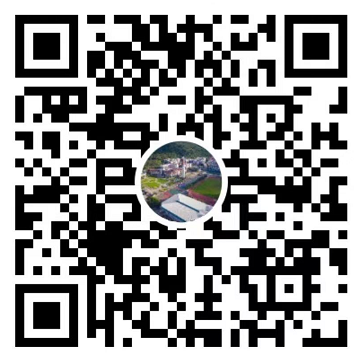 视频号
视频号